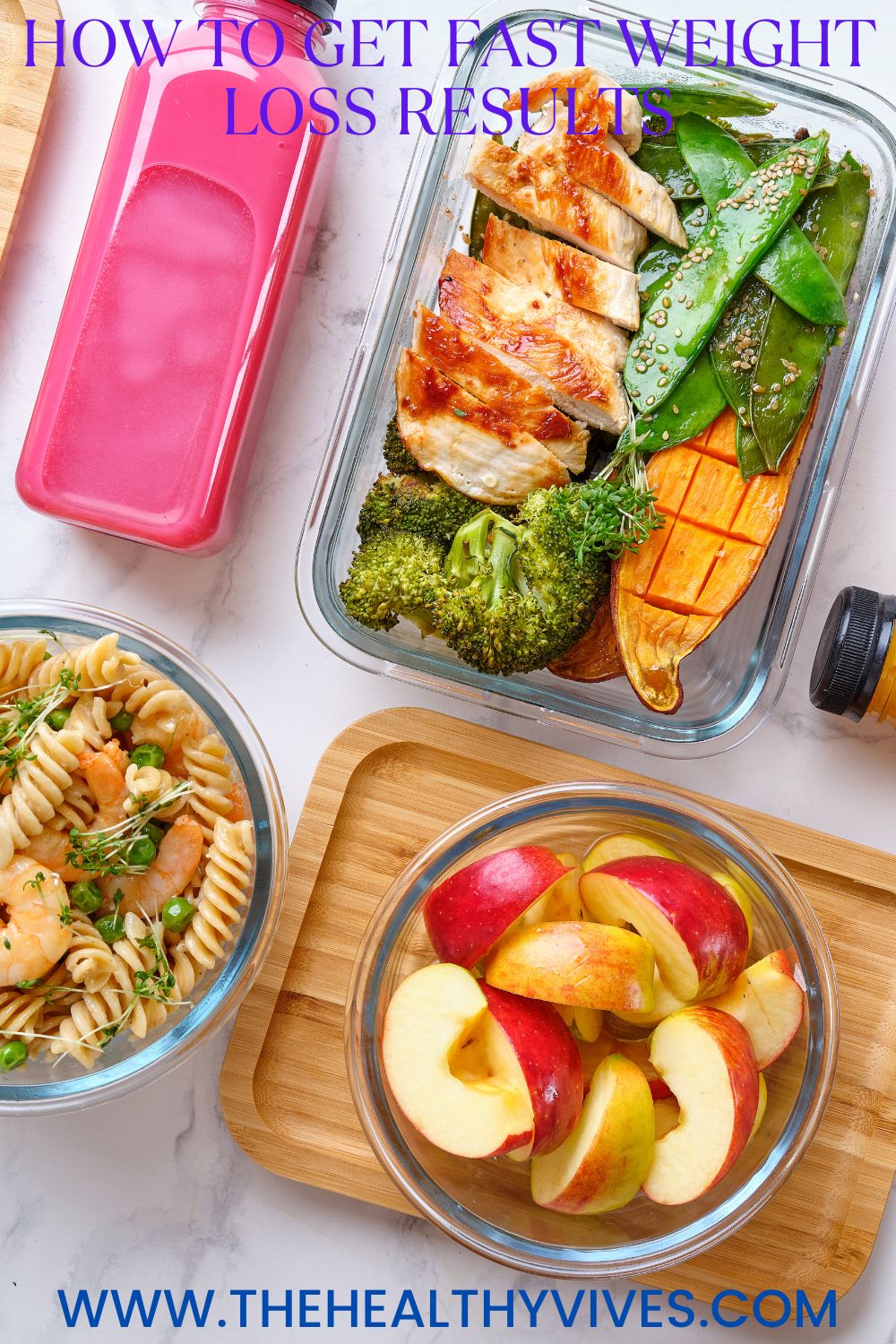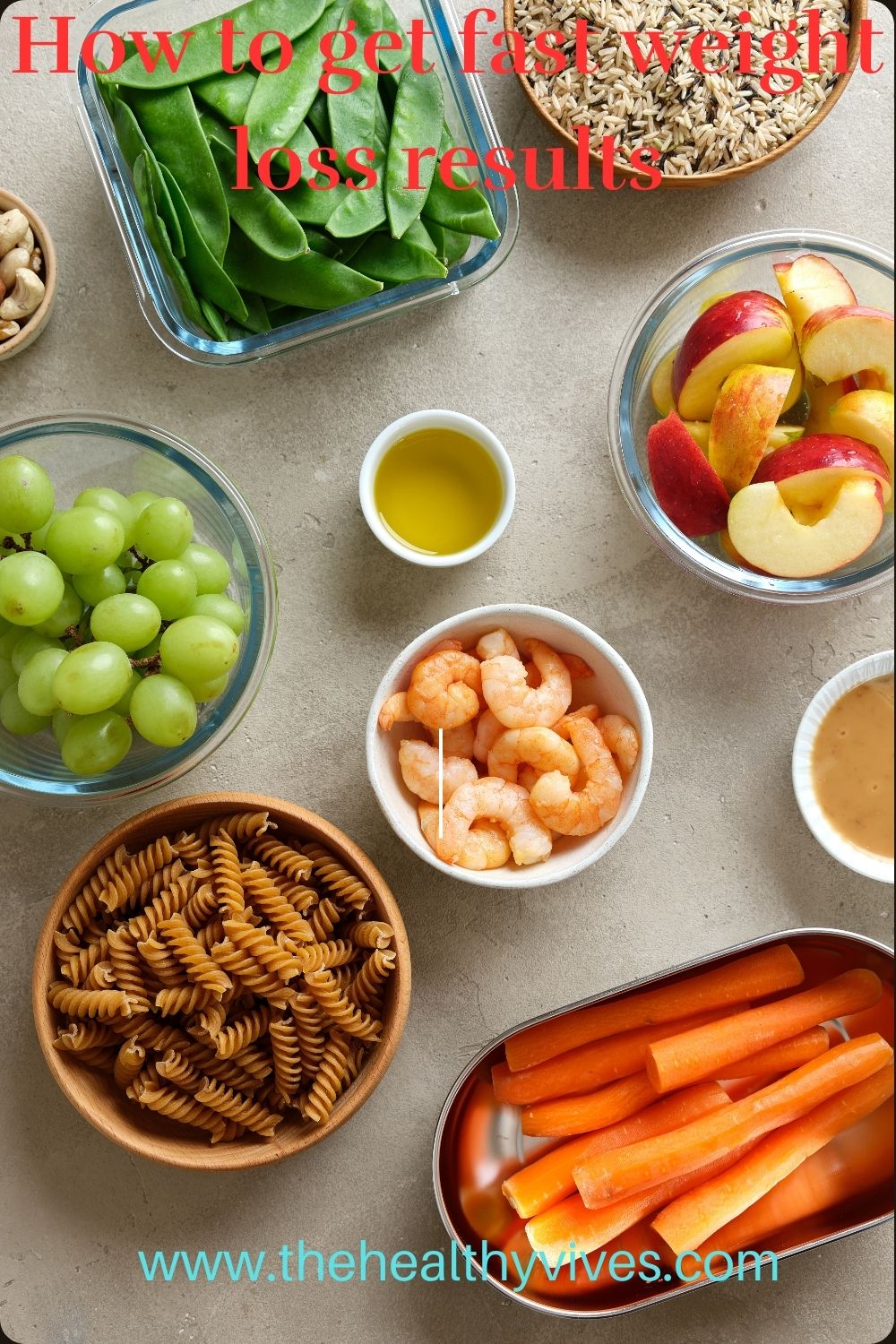
How to get fast weight loss results Achieving and maintaining a healthy weight can significantly impact many aspects of life, from physical health to self-confidence and overall well-being. Many people try to lose weight for various reasons. For some, it’s a response to health concerns like reducing the risk of heart disease, diabetes or joint pain. Others are driven by lifestyle changes, aiming to feel more energetic and fit to participate fully in their daily activities. While quick fix diets and extreme weight loss methods may seem appealing for quick results, they often lead to short-term success and potential health risks. temporary fixes.
True, effective weight loss focuses on developing sustainable habits that improve long-term health. By setting the right tone from the start, it’s possible to cultivate a positive mindset that prioritizes holistic wellness over quick.
How to get fast weight loss results
Set Clear, Achievable Goals
Instead of vague objectives like “I want to lose weight,” define specific goals like “I want to lose 1-2 pounds per week.”
Balancing short-term and long-term goals is equally important. Short-term goals, such as losing five pounds in a month, can provide instant motivation and a sense of accomplishment. Meanwhile, long-term goals, such as achieving a healthy weight within a few months or even a year, ensure that you maintain a focus on sustainable lifestyle changes. By setting both types of goals, you create a roadmap that allows you to celebrate small successes while keeping an eye on the big picture.
Understand Your Motivation
Motivations can vary from person to person – some may want to improve their health and reduce their risk of conditions such as heart disease or diabetes, while others may seek improved physical fitness or self-care. Identifying your personal reasons will motivate you, especially when the going gets challenging. Understanding your motivation also strengthens your emotional resilience. When you have a clear idea of your “why,” obstacles are easier to overcome, and regularly reflecting on these motivations can strengthen your commitment and drive you toward your weight loss goals.
Dietary Strategies for Effective Weight Loss
Rather than focusing on restrictive dieting, functional strategies promote balanced nutrition that not only aids in weight loss but also improves overall health. Here are the main dietary strategies to consider
Create a Caloric Deficit
Weight loss occurs when you consume fewer calories than you burn, creating a calorie deficit. However, it is important to achieve this deficit through mindful, balanced eating rather than extreme restriction. Food preparation is another effective strategy; By planning and preparing meals in advance, you’re less likely to go for unhealthy options. Finally, practice mindful eating: pay attention to hunger and fullness cues and savor every bite to avoid mindless snacking.
Focus on Nutrient-Dense Foods
Include a variety of fruits, vegetables, lean proteins and whole grains in your diet. These foods are packed with vitamins, minerals and fiber, providing essential nutrients while keeping you full and energized. For example, colorful vegetables and fruits are low in calories but high in nutrients and water, which help you feel satisfied. Lean proteins like chicken, fish, tofu and legumes help maintain muscle, by focusing on nutrient-dense foods, you support your body’s needs and make it easier to maintain a calorie deficit without feeling deprived.
Incorporate Protein and Fiber
Your partner in weight management. Protein helps preserve muscle mass, which is crucial for maintaining metabolism during weight loss. It keeps you fuller for longer, reducing the chance of overeating. Include protein-rich foods in your diet, such as lean meats, eggs, legumes, and dairy products.
Fiber-rich foods like fruits, vegetables, whole grains, and legumes aid digestion, keeping you feeling fuller for longer. Additionally, fiber supports digestive health, contributing to a smoother and more effective weight loss process.
Limit Added Sugars and Refined Carbs
Sugars and refined carbohydrates can contribute to weight gain by providing extra calories with little nutritional value. High sugar intake can cause blood sugar spikes and crashes, increased cravings and hunger. Likewise, refined carbohydrates found in foods like white bread, pastries and sugary cereals lack fiber, which leads to faster digestion and less satiety. Which can help you manage your weight better and improve overall health.

Exercise Strategies for Effective Weight Loss
Exercise is a key component of an effective weight loss strategy. Here are some strategies to effectively integrate physical activity into your weight loss plan
Combine Cardio and Strength Training
A combination of cardio and strength training is essential to achieve and maintain weight loss. Cardio exercise, such as running, cycling, swimming and brisk walking, helps burn calories and improve cardiovascular health.
A combination of both types of exercise
You can go for a 30-minute run three times a week and include two strength training sessions focusing on major muscle groups using exercises like squats, deadlifts, push-ups and weightlifting. This combination not only accelerates fat loss but also helps to tone the body and improve physical strength. Incorporating variety into your routine keeps it engaging and ensures a more balanced approach to fitness.
High-Intensity Interval Training (HIIT)
E-Intensity Interval Training (HIIT) is a very effective way to burn calories in a short amount of time. This technique keeps your heart rate elevated, promotes more fat burning, and increases your metabolism hours after a workout.
Advantages of HIIT : HIIT can be adapted to different fitness levels and requires little or no equipment.
Sample HIIT Workout : A typical beginner routine might include 30 seconds of high-intensity exercise such as jumping jacks, burpees or mountain climbers, followed by 30 seconds of rest. Repeat this cycle for 15-20 minutes. As your fitness improves, you can increase the intensity, duration and variety of exercises,
Increase Daily Physical Activity
Increasing daily physical activity can significantly contribute to weight loss. Small lifestyle changes that encourage movement throughout the day can help burn extra calories without formal exercise.
Tips for increasing movement
Walking : Incorporate more walking into your day by choosing to walk or bike.
Use the stairs : Choose the stairs instead of the elevator to add extra cardio to your routine.
Standing breaks : Consider using a standing desk to reduce sitting time.
Active hobbies : Engage in activities that you enjoy that require movement, such as dancing, gardening or sports.
By making these small adjustments, you can increase your overall energy expenditure and support your weight loss goals while building healthy habits in the long term.
Lifestyle Adjustments for Lasting Weight Loss
Lifestyle changes are just as important as diet and exercise. Developing healthy habits around sleep, stress management and progress tracking can make a significant difference in your long-term success.
Prioritize Quality Sleep
Adequate sleep is often overlooked in weight management, but it plays an important role in regulating appetite and metabolic hormones. Poor sleep disrupts the balance of ghrelin (the hunger hormone) and leptin (the satiety hormone), leading to increased hunger and cravings, especially for high-calorie, sugary foods.
Tips for improving sleep habits
Consistent sleep schedule
Create a sleep-friendly environment
Wind down
Prioritizing 7-9 hours of quality sleep per night can boost your energy levels, increase your metabolism and help control appetite, aiding your weight loss journey.
Manage Stress Effectively
Stress can significantly affect weight loss efforts. Additionally, stress often leads to emotional eating, where individuals consume comfort foods high in sugar and fat.
Effect of stress on weight
Stress-Relief Activities
Meditation: Practice mindfulness or guided meditation to clear your mind and reduce stress.
Yoga: Yoga combines physical movement with mental breathing, helping to reduce stress, improve flexibility and support mental clarity.
Hobbies: Engage in activities such as painting, gardening or cooking to take your mind off everyday stress and promote relaxation.
Track Progress and Stay Consistent
Tracking your progress is essential to stay motivated and make informed adjustments to your weight loss plan.
Importance of monitoring: Regularly tracking your weight, body measurements and fitness milestones helps maintain focus and commitment.
Using tracking tools
Apps: Use health and fitness apps to log food intake, exercise, sleep and hydration.
Journal: Keeping a daily journal of your food, mood and physical activity can help identify unhealthy behavior patterns and triggers.
Progress photos and measurements: In addition to the scale, track changes in body measurements (waist, hips, arms) and take progress photos.
This lifestyle not only helps with weight loss but also helps establish healthy habits that contribute to long-term wellness.
Sustainable Eating Habits
Establishing sustainable eating habits is crucial for effective and long-lasting weight loss.
Practice Mindful Eating
How mindful eating helps you lose weight: By slowing down and focusing on your eating experience, you become more aware of portion sizes, the taste of food, and your body’s cues. This awareness helps prevent mindless snacking and emotional eating, which can lead to weight gain. Eating slowly gives your body time to signal fullness, reducing the likelihood of overeating.
Mindful Eating Techniques
Avoid confusion
Savor every bite
Listen to hunger cues: Before eating, pause to assess whether you are truly hungry or eating out of habit or impulse. By incorporating mindful eating, you can develop a healthy relationship with food, making weight management more manageable and enjoyable.
Avoid Fad Diets
Fad diets often promise quick results by severely restricting certain foods or food groups. They are usually unstable and can negatively affect your health.
Extreme Diet Faults: Many fad diets limit essential nutrients, which can lead to fatigue, nutrient deficiencies, and slow metabolism.
Encourage a balanced, long-term approach
Include all food groups: Aim for a varied diet that includes fruits, vegetables, lean proteins, whole grains and healthy fats.
Moderation, not elimination: Instead of cutting out certain foods completely, practice moderation.
Focus on whole, unprocessed foods: Choose minimally processed foods rich in nutrients, fiber and protein.
Choosing a sustainable, balanced dietary approach over quick-fix diets helps develop healthy habits that are easier to maintain long-term. It leads to steady, effective weight loss while supporting overall health and wellness.

Safe Use of Supplements (If Needed)
Relying on them alone without lifestyle changes is not effective for long-term weight management.
Overview of Common Weight Loss Supplements
Here is an overview of some commonly used supplements
Green Tea Extract: Green tea extract is popular for its potential to boost metabolism and promote fat burning. It contains compounds called catechins, specifically epigallocatechin gallate (EGCG), which have been shown to increase fat oxidation.
Protein Powder: Protein is vital for muscle preservation, metabolism and satiety during weight loss. Protein powders, such as whey, casein, or plant-based alternatives such as soy and pea proteins, provide a convenient way to meet daily protein needs.
Fiber supplements: Fiber aids digestion and helps you feel fuller longer, which can support weight loss efforts. Whole foods such as fruits, vegetables, and grains are the best sources of fiber, but supplements such as psyllium husk, glucomannan, and inulin may be beneficial if dietary fiber intake is low.
Safety assessment
Personalized guidance
Avoid false claims: The supplement market is flooded with products that promise rapid weight loss but lack scientific backing. Although supplements can support weight loss efforts, they should complement a balanced diet and regular exercise rather than replace them. The key to safe and effective weight loss lies in a holistic approach that prioritizes health and sustainability.
Overcoming Plateaus
Plateaus are a normal part of the weight loss journey, but they can be overcome with some strategic adjustments and a patient mindset.
Adjusting Diet and Exercise
When you experience a plateau, it often means that your body has adapted to your current routine.
Change your diet
Reassess calorie needs: As you lose weight, your body needs fewer calories to function.
Cycle Macronutrients: This can boost your metabolism and burn fat.
Watch portion sizes: Reevaluate your portions to make sure they are consistent with your weight loss goals.
Change your exercise routine
Modified workouts: Your body can quickly adapt to a set exercise routine, which can slow down progress.
Increase intensity: If you’ve been working out regularly, consider increasing the intensity or duration of your workouts.
Include rest days: Sometimes, a plateau can be a sign of overtraining. Make sure to include rest days in your workout routine to allow your muscles to recover, which can improve performance and aid in weight loss.
Patience and Persistence
It is important to be patient and persistent, these periods are temporary if you keep trying.
Embrace the Process
Use this time to reflect on how far you’ve come and celebrate non-scale victories, such as improved fitness levels, better sleep, or improved mood.
Stay consistent
The key to overcoming plateaus. Remember, progress isn’t always linear and your body may need time to adjust before losing more weight.
Reevaluate your goals
Sometimes, shifting focus helps to rekindle motivation and lead to new progress. A combination of patience and persistence is required. By reevaluating your diet and exercise routine, adding variety, and staying committed to your long-term goals, you can push past plateaus and get on the path to effective, sustainable weight loss.
Conclusion
Combine regular exercise and sustainable lifestyle changes. By focusing on creating a calorie deficit, prioritizing nutrient-dense foods, incorporating both cardio and strength training, managing stress, and ensuring adequate sleep, you can set yourself up for long-term success.
Remember, How to get fast weight loss results, your journey to wellness is one of improvement, not perfection. Embrace the process, be patient with yourself and stay committed to your goals. By focusing on long-term health, wellness, and steady progress, you’ll not only achieve your weight loss goals but also develop habits that will benefit your overall well-being for years to come.

